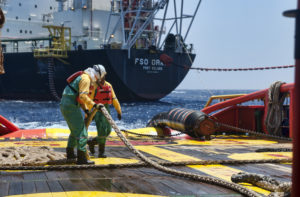OCIMF has introduced new Publications and Information Papers with respect to the safe and environmentally responsible operation of oil tankers, terminals and offshore support vessels, promoting continuous improvement in standards of design and operation. The new Publications and Information Papers published during 2018 are the following:
-Guidelines for Offshore Tanker Operations (Publication)
This new publication provides guidance on the general principles, procedures and equipment required to safely moor and transfer cargo between offshore terminals and offtake tankers.

-Cargo Guidelines for F(P)SOs (Publication)
This new publication provides recommendations, best practice and guidance on the safety of cargo handling and associated operations on board F(P)SO facilities.
-Mooring Equipment Guidelines (MEG4) (Publication)
This publication establishes recommended minimum requirements that will help ship designers, terminal designers, ship operators and mooring line manufacturers improve the design, performance and safety of mooring systems.
-Recommendations for Liquefied Gas Carrier Manifolds (Publication)
This document provides recommendations on the layout, strength and fittings for gas carrier manifolds.
-Transfer of Personnel by Crane between Vessels (Information Paper)
This information paper is intended to help vessel operators and owners, Masters, officers, Marine Superintendents and Mooring Masters evaluate the risks associated with the transfer of personnel by a vessel’s onboard crane.
Deck Cargo Management Onboard Offshore Vessels (Information Paper)
This information paper provides risk-based guidance and best practices on how to manage deck cargo in the offshore marine industry. It will help vessel Masters, offshore industry personnel and vessel crews adopt safe working practices for deck cargo handling between shore base operations, offshore facilities and vessels.
-Sharing Lessons Learned from Incidents (Information Paper)
This information paper outlines the most effective ways that vessel operators can share the lessons that we learn from incident investigations.
-Behavioural Competency Assessment and Verification for Vessel Operators (Information Paper)
This paper presents a system for assessing competency in seafarers.
A Guide to Best Practice for Navigational Assessments and Audits (Information Paper)
This information paper gives guidance on how to conduct a good navigational assessment, including: • How assessments should be designed. • Why assessments are carried out. • Who should carry out assessments. • How an assessor should conduct assessments. • How the results can be used to identify trends and training requirements. The paper also features a full template that companies can use as a guide when developing their own navigational assessments.
Marine Terminal Information Booklet: Guidelines and Recommendations (Information Paper)
This information paper gives terminal operators a template for presenting important terminal and port information in a booklet, for easy reference by vessel personnel, vessel owners, operators, charterers and others.
Guidelines to Harden Vessels (Information Paper)
This information paper brings together best practice both on board a vessel and for owners, operators, managers, Masters, crew, naval architects and shipyards, so everyone has a tools they need to make an informed decision about security meausures for their fleet.
Safety Critical Equipment And Spare Parts Guidance (Information Paper)
The purpose of this information paper is to provide guidance on safety critical spare parts for companies to consider when preparing a Safety Management System (SMS). It is equally applicable to companies managing any type of vessel.
Source: https://www.ocimf.org/publications.aspx
Contact us to receive a professional advisory in your area of interest.
